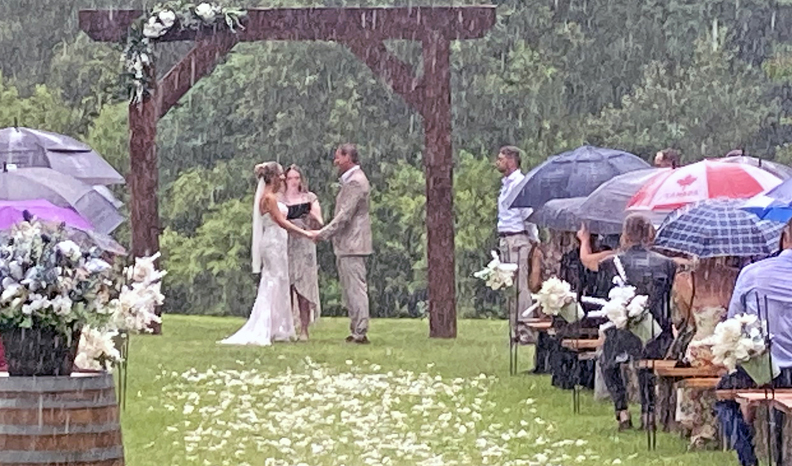
Thomas Froese
Bride Sarah Chamberlain and groom Brandon Ryckman share their vows in the rain during a recent wedding ceremony near St. Thomas, ON.
(The Hamilton Spectator – Saturday, September 16, 2023)
Here’s something for young people. Who you marry will have a larger impact on your life than your career.
I’m reading about it in The New York Times and The Atlantic. There’s a new wave of research. Marry and be happy. This is what it says. It’s interesting because it’s easy to assume, especially in western culture, that career is at your life’s core.
True, marriage isn’t for everyone. “Marriage is so unlike anything else,” is how George Eliot puts it in “Middlemarch,” her epic novel. “There’s something nearly awful in the nearness it brings.” That was in 1871.
Today, marriage draws even more suspicion. The average Canadian marriage now lasts just 14 years. This summer our own prime minister separated. Why launch your life ship into such perilous waters?
It’s like the outdoor wedding I recently attended. Of course, it rained. Just poured. The bride – not that she really cared – got soaked. It’s one picture of marriage today.
Still, there are plenty of encouraging marital stories out there. And marriage can have significant downstream benefits.
Consider in recent decades, according to surveys, North Americans not only marry less, but are less happy. Researchers like Sam Peltzman, a Chicago economist and academic, connects the two. After looking at variables of income, education, race, location and gender, he comes to one conclusion. Married people are happier. Period.
Take 50 marrieds. Forty will be happy and 10 unhappy. Take 50 singles (divorced, widowed or never-married) and it’s closer to an even 25-25 split between happy and unhappy. This is Peltzman’s research.
“Get Married,” an upcoming book by sociologist Brad Wilcox, has similar conclusions. Responses of being “very happy” in life are more than 500 per cent higher for people who are “very happily” married, compared with the unmarried, or married but not “very happily.”
To be clear, this “Get Married” mantra means marry the right person at the right time. Also, “happiness” can be a hazy idea. You don’t go and get “happiness” (or a life partner) like you get a bag of milk from the corner store. Happiness, or contentment, grows from everyday choices, not your marital status.
This from someone who was single well into my 30s. As far as I was concerned, people worrying about my unmarried state were either ignorant meddlers (most were this) or idolaters (you can idolize marriage like you can idolize anything.)
So I appreciate singleness. Regardless, what are we to make of increasingly-documented benefits of marriage?
One view is that marriage doesn’t change your inner disposition. If you’re happy in marriage it’s because you were happy single. Likewise, unhappy while single, unhappy in marriage. (Which leads to divorce and feeds the unhappy, single pool.)
A different view is that marriage, in fact, gives an uptick to your happiness-metre, especially when seeing your spouse as your best friend. We have a deep human need to be known fully, warts and all, and loved, regardless. Committed marriages give this security. Even less formally committed civil unions give a smaller, two-thirds boost in happiness, says one European study.
And about career? Commentator David Brooks suggests this: “Please respect the truism that if you have a great career and a crappy marriage you will be unhappy, but if you have a great marriage and a crappy career you will be happy.”
Of course, career and marriage are both important. But do young people study and prepare for marriage with the same investment as their careers? Probably not. Considering the stakes, why not? Where are helpful public courses on, say, “Why some marriages thrive, and others sink?”
Speaking of, here’s a fun fact. One of history’s better-known ships, the Mayflower, set sail today, Sept. 16, in 1620. But even it had to turn back and relaunch – twice – because of a failed companion ship, the Speedwell.
All the more, then, strengthen the sails of your own ship. When the good wind comes, then you’ll know you’re ready.
